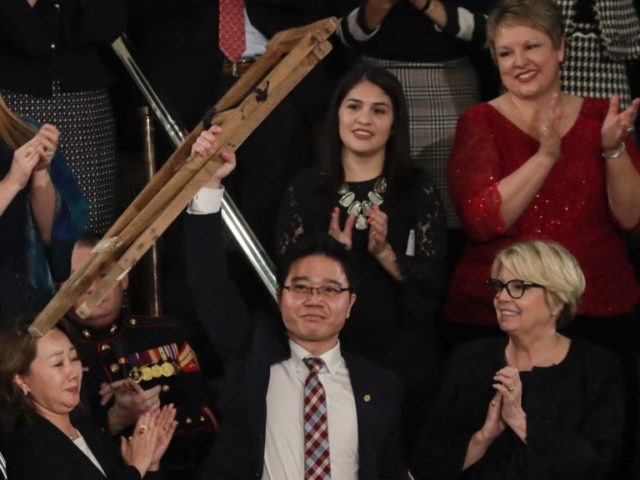Ji Seong-ho, a North Korean exile who attended President Donald Trump’s 2018 State of the Union Address as a guest of the president, won a seat in South Korea’s National Assembly, the federal legislature, on Wednesday.
Ji became a prominent human rights advocate in South Korea after escaping the country and traveling illegally across China, evading Communist Party officials mandated to apprehend and repatriate fleeing North Koreans, often resulting in their deaths. He will join the National Assembly as a member of the Future Korea Party, a conservative party, in a seat allocated by proportional representation. He is the second North Korean defector in South Korea’s history to receive such a seat.
In 2018, Ji joined the audience at Trump’s State of the Union after a tumultuous year between Washington and Pyongyang. In September 2017, North Korea conducted its last known nuclear bomb test. The test outraged so much of the world that the Trump administration managed to convince the United Nations Security Council – where North Korean allies China and Russia have veto powers – to pass the strictest sanctions regime ever levied on any country in history. Trump highlighted Ji’s story as an example of the brutality of the North Korean regime and the perseverance of its victims.
“One day he tried to steal coal from a railroad car to barter for a few scraps of food, which were very hard to get. In the process, he passed out on the train tracks, exhausted from hunger,” President Trump told the audience of Ji. “He woke up as a train ran over his limbs. He then endured multiple amputations without anything to dull the pain or the hurt. His brother and sister gave what little food they had to help him recover and ate dirt, themselves, permanently stunting their own growth.
“Later he was tortured by North Korean authorities after returning from a brief visit to China. His tormentors wanted to know if he’d met any Christians. He had and he resolved after that to be free. Seong-ho traveled thousands of miles on crutches all across China and southeast Asia to freedom,” Trump noted. “Today, he lives in Seoul, where he rescues other defectors and broadcasts into North Korea what the regime fears most. The truth.”
North Korea’s state media responded to Trump’s remarks at the State of the Union by claiming he had a “nasty smell” and should be “urgently sent to a lunatics asylum.”
Another North Korean defector, former diplomat Thae Yong-ho, made history as the first exile from the country to win one of the South Korean legislature’s seats allocated to individuals rather than parties. Thae has also advocated for human rights and basic freedoms for his people after spending years working at a North Korean diplomatic outpost in London.
For years, Thae has warned that, from his understanding as a former communist regime insider, dictator Kim Jong-un would never give up the country’s nuclear program.
“The final destination that the North is headed for is not to completely dismantle its nuclear weapons program but become a nuclear weapons state covered by the paper called denuclearization,” Thae warned in 2018, stating that Kim viewed the weapons as “a sword and a shield for eternal prosperity, prosperity and happiness for generations to come.”
Thae won his seat representing the nation’s major conservative party, the United Future Party (UFP).
The UFP was created by the merger of several political parties, primarily the Liberty Korea Party, which collapsed in popularity after the impeachment, arrest, and conviction of former President Park Geun-hye, felled by a scandal in which she was accused of allowing a friend and cult member to edit sensitive foreign policy materials. Park was sentenced to 24 years in prison in 2018.
South Korea held nationwide elections to fill all 300 seats of its National Assembly on Wednesday, the first major country to do so in the midst of the Chinese coronavirus pandemic. The Assembly has only one chamber made up of 253 seats that are directly elected – voters choose an individual – and 47 by proportional representation, in which voters choose a party, which chooses the lawmaker.
Wednesday’s election occurred without incident, by all accounts, despite a high voter turnout and social distancing guidelines in place. The South Korean newspaper Joongang Ilbo reported that over 65 percent of eligible voters exercised their rights. At press time, no candidate or groups is contesting the results of the election or questioning if it occurred in a free and fair atmosphere.
Despite the North Korean exiles winning victories for the right, leftist President Moon Jae-in and his Democratic Party won the legislative elections in a landslide. South Korean news agency Yonhap reported that the Democratic Party and affiliated left-wing groups won 180 of the Assembly’s 300 seats, nearly double the number UFP managed to win. The outlet noted that it was the largest majority in the history of democratic Korea; others remarked that, assuming vote by party lines, the only type of law the Democratic Party can now not pass without support from any other party is a constitutional amendment.
South Korea is home to an estimated 33,000 North Korean refugees.

COMMENTS
Please let us know if you're having issues with commenting.